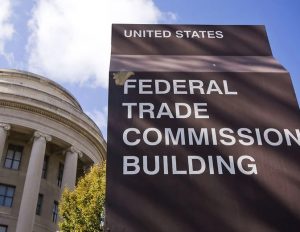 A divided Federal Trade Commission on Tuesday finalized a rule prohibiting employers from imposing noncompete agreements on their workers, a controversial regulation that global tax services provider Ryan greeted by filing suit in a Texas federal court saying the FTC’s action exceeds its statutory authority.
A divided Federal Trade Commission on Tuesday finalized a rule prohibiting employers from imposing noncompete agreements on their workers, a controversial regulation that global tax services provider Ryan greeted by filing suit in a Texas federal court saying the FTC’s action exceeds its statutory authority.
The U.S. Chamber of Commerce announced its own plans to sue within hours of the FTC’s party-line 3-2 vote.
The rule will generally ban employers from entering, maintaining or attempting to enter a noncompete agreement with an employee, or conveying—absent a good-faith basis—that a worker is subject to a noncompete clause.
Existing noncompete agreements for senior executives—those earning more than $151,164 annually and in policymaking positions—will be allow to remain in force. The final rule will take effect 120 days after its coming publication in the Federal Register.
Employers who enter into noncompetes with workers will be considered in violation of the FTC Act, which bans unfair methods of competition.
FTC Chair Lina Khan praised the new rule, saying the agency had “heard from employees who because of noncompetes were stuck in abusive workplaces.”
“We heard from physicians who served underserved areas of the country who explained how noncompetes restricted their ability to continue serving their patients,” Khan said.
“I note these accounts because, in my mind, they really point to the basic reality of how robbing people of their economic liberty also robs them of all sorts of other freedoms, chilling people’s speech, infringing on their religious practice, and impeding people’s right to organize,” Khan added. “And in our American system we have long viewed open markets and free enterprise as a key bulwark against coercion and centralized control. And it’s been striking as we go through the record and all of these stories that they show in a very clear and concrete way, how noncompetes restrict this most basic freedom.”
Joining Khan in support of the rule were fellow Democratic Commissioners Rebecca Kelly Slaughter and Alvaro Bedoya.
Republican Commissioners Andrew Ferguson and Melissa Holyoak dissented, saying the agency lacks statutory authority under the FTC Act to adopt the rule.
“The modern administrative state may be accustomed to the ease and breadth of legislative rulemaking, but an agency should not lose sight of those constitutional prescriptions and should, therefore, approach legislative rulemaking with circumspection,” Holyoak said.
Ferguson called the rule “unlawful.”
“Our Constitution assigns Congress the legislative power because Congress answers to the people for its choices,” Ferguson said. “We are not a legislature. We are an administrative agency wielding only the power lawfully conferred on us by Congress. Americans can’t vote us out when we get it wrong.”
Khan disagreed, saying the agency’s statutory authority is clear.
“First, in my mind, the plain text of the FTC Act clearly gives the agency the authority to promulgate rules addressing unfair methods of competition,” Khan said. “To my mind, arguing that the FTC lacks this authority requires ignoring the most straightforward reading of the text.”
But Ryan, in announcing its lawsuit, said a ban on noncompete agreements not only interferes with the freedom to contract but undermines technological growth.
“Among other benefits, non-compete agreements incentivize companies to invest in research and development, empower collaborative work environments, and instill a commitment to aiding personnel growth and development,” the company stated. “These arrangements, mutually agreed upon by the employer and employee, enable all parties to maximize their output in an open and dynamic work environment. Innovations fueled by collaboration is critical to the modern economy.”
Dallas-based Ryan is being represented by Gibson, Dunn & Crutcher in the lawsuit filed in the U.S. District Court for the Northern District of Texas. Former U.S. Labor Secretary Eugene Scalia, of Gibson Dunn, is serving as lead counsel, Ryan stated.
Meanwhile, the U.S. Chamber of Commerce said shortly after the FTC vote that it will follow through on its pre-vote pledge to sue the agency over its ban on noncompete agreements.
“The Federal Trade Commission’s decision to ban employer noncompete agreements across the economy is not only unlawful but also a blatant power grab that will undermine American businesses’ ability to remain competitive,” the chamber said in statement Tuesday. “The Chamber will sue the FTC to block this unnecessary and unlawful rule and put other agencies on notice that such overreach will not go unchecked.”
Former FTC Commissioner Terrell McSweeny, now a senior of counsel at Covington & Burling, called the final rule “a very significant action.”
“They’re using their authority under Section 5 of the FTC Act to police unfair methods of competition to promulgate this rule. And it’s an interesting, potential expansion of the FTC’s authority under this statute to use what we call the UMC, the unfair methods of competition, authority in this way,” McSweeny said.
“It’s a historic action by the FTC, but it also has really wide-ranging implications for employers and employees,” McSweeny added. “It will still essentially ban noncompete clauses and employment agreements for most employees, with some exceptions for senior executives that are pretty narrow. And, it will cover every part of the economy that the FTC has jurisdiction over.”
Benjamin Dryden, an antitrust lawyer at Foley & Lardner, said, “There’s no question that there is more risk to entering into a noncompete agreement today than yesterday. There’s no question. So that absolutely changes the conversation.”
“But we’re going to watch this Chamber of Commerce litigation and see what other litigations have followed or will follow,” Dryden added. “And I would advise a client not to do anything drastic just yet, and let’s allow the process to play out.”
NOT FOR REPRINT
© 2024 ALM Global, LLC, All Rights Reserved. Request academic re-use from www.copyright.com. All other uses, submit a request to [email protected]. For more information visit Asset & Logo Licensing.
NOT FOR REPRINT
© 2024 ALM Global, LLC, All Rights Reserved. Request academic re-use from www.copyright.com. All other uses, submit a request to [email protected]. For more information visit Asset & Logo Licensing.








